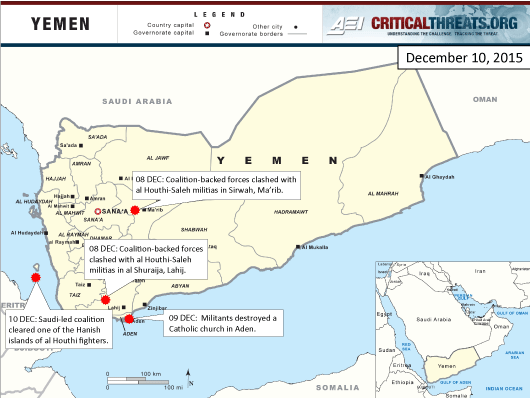A former Guantanamo detainee resurfaced in Yemen as an al Qaeda in the Arabian Peninsula (AQAP) leader and spokesman. AQAP’s decision to publicize the detainee’s presence in a new video was probably an attempt to capitalize on the former detainees’ high standings within the global jihadist movement and shows AQAP taking advantage of the ongoing crisis in Yemen to reconstitute its leadership and sustain its notoriety for attacking Western targets.
AQAP featured a former Guantanamo detainee in a new video emphasizing its commitment to jihad against the United States. Ibrahim Ahmed Mahmoud al Qosi appeared in the video alongside AQAP leaders Khaled al Batarfi, Hamad al Tamimi, and Ibrahim Abu Saleh. Qosi was released to Sudan in July 2012 and, according to AQAP, joined the group in December 2014. The video, an hour-long documentary by AQAP’s al Malahem Media Foundation entitled “Guardians of Shariah,” details the group’s history of jihad against American interests and emphasizes the connections between AQAP-linked attacks in the West and the late AQAP senior leader Anwar al Awlaki, a Yemeni-American cleric. (Video obtained through SITE.) AQAP also calls for jihadists to follow recognized clerics, an attempt to delegitimize the narrative of the Islamic State of Iraq and al Sham (ISIS).
Southern Movement leaders are gaining power in Aden, which may undermine a long-term objective of a unitary Yemeni state. Southern militias partnered with the Saudi-led coalition to drive the al Houthi-Saleh alliance out of Aden, but they do not necessarily share the coalition’s objective to reinstate the central government under President Abdu Rabbu Mansour Hadi. Hadi is attempting to build support and may be seeking to leverage the local legitimacy of southern leaders to garner support for himself. He appointed prominent southern military leaders Aydarus al Zubaidi and Shalal Ali Shaye’a as governor and police chief of Aden, respectively, after the December 6 assassination of Aden Governor Jaafar Mohammed Saad by an ISIS affiliate. Hadi remains unlikely to find sustained support in the south despite these appointments because he backed former president Ali Abdullah Saleh against the southerners in the 1994 civil war. Al Zubaidi and Shaye’a are reportedly supporters of exiled Southern Movement (al Hirak) leader and former vice president of South Yemen, Ali Salem al Beidh. Al Beidh and his son met with Emirati Minister of Foreign Affairs Anwar Gargash in Abu Dhabi on December 8, indicating that southern powerbrokers may be attempting to influence the diplomatic process and defend their interests in any negotiated resolution to the Yemen conflict, possibly at the expense of coalition-backed President Hadi.
UN-led peace talks will begin on December 15 in Geneva, in conjunction with a seven-day ceasefire, but the combatants’ willingness to uphold the ceasefire remains uncertain. President Hadi told the UN on December 7 that he asked the Saudi-led coalition to initiate the temporary ceasefire. The al Houthis and Saleh’s faction have yet to comment on the ceasefire, though UN Special Envoy to Yemen Ismail Ould Cheikh Ahmed said that the al Houthi-Saleh alliance is committed to the peace process. Ismail Ould Cheikh Ahmed also announced a media blackout for the Geneva talks, indicating the ongoing fragility of negotiations.
Neither side is likely to secure a territorial advantage before the December 15 ceasefire. Clashes between coalition-backed troops and the al Houthi-Saleh alliance continued along established frontlines. Weeks- and months-long fighting continued near Labanat military base in al Jawf governorate in northern Yemen, in al Shuraijah on the Taiz-Lahij border in southwestern Yemen, and in Sirwah, Ma’rib governorate in central Yemen. The Saudi-led coalition broadcast a victorious narrative after clearing two Red Sea islands on December 10, but this operation is likely a response to al Houthi-Saleh counterattacks in the region, not a significant territorial gain. Fighting will continue along the primary frontlines, which are fixed along lines of support in Yemen’s human terrain, as both sides seek to consolidate territory before peace talks commence next week.
The ongoing power struggle in Yemen will continue to provide opportunities for AQAP to expand throughout the country and develop a support zone from which it can launch attacks on Western interests.
James Towey contributed research to this report.

